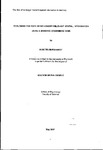EXPLORING THE FATE OF NO LONGER RELEVANT SPATIAL INFORMATION USING A MODIFIED STERNBERG TASK
| dc.contributor.author | BURGHARDT, KIRSTEN | |
| dc.contributor.other | Faculty of Science and Engineering | en_US |
| dc.date.accessioned | 2013-09-24T09:53:55Z | |
| dc.date.available | 2013-09-24T09:53:55Z | |
| dc.date.issued | 2007 | |
| dc.identifier | NOT AVAILABLE | en_US |
| dc.identifier.uri | http://hdl.handle.net/10026.1/1914 | |
| dc.description.abstract |
Forgetting, the breakdown of memory, is often associated with inconveniences in everyday life when the car key has been left on the kitchen table or when a phone number will simply not come to mind. However, forgetting has its justified and valued place in cognition. Forgetting allows us to remember the place where we parked our car today, rather than two weeks ago, it enables us to update previously incorrect information in our memory, and It gives us the opportunity to move on from unpleasant past experiences. | |
| dc.language.iso | en | en_US |
| dc.publisher | University of Plymouth | en_US |
| dc.title | EXPLORING THE FATE OF NO LONGER RELEVANT SPATIAL INFORMATION USING A MODIFIED STERNBERG TASK | en_US |
| dc.type | Thesis | |
| plymouth.version | Full version | en_US |
| dc.identifier.doi | http://dx.doi.org/10.24382/4493 |
Files in this item
This item appears in the following Collection(s)
-
01 Research Theses Main Collection
Research Theses Main


